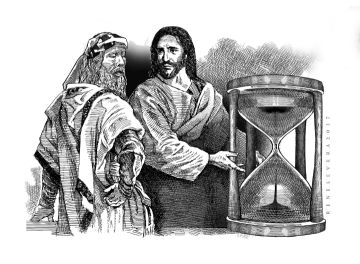
The radio clock’s alarm went off as set — at six in the morning when a radio commentary would go on air. This time the comments took up the landslides caused by days of rain, and how the owner of a house on a mountain destroyed his dwelling — a rather well-built structure — rather than let it slide down the slope and fall on the highway, dealing harm or even death to those taking it.
But not even hearing this radical act to forestall a terrible prospect could rouse me up from bed. The drizzly night had lulled me into stupor, and eased my body to yearn for more sleep. But suddenly a thought hooked my mind, causing me to sit up — in a moment our daughter would call on us to babysit her infant, something that, no matter how exhausted, the wife and I looked forward to.
I could see, when I peeped into the living room, that the wife had everything prepared — the curtains drawn, the fancy little lights (which the child favored) a-sparkle, and the TV turned on, set for the nursery rhymes on YouTube. We would have about an hour with the little one before her nurse arrived for her feeding. And since the wife showed signs of taking the first crack at watching the child, I withdrew to a corner and opened the Liturgy of the Hours for Morning Prayer.
For my Lectio Divina (scripture reading, meditation and prayer), I picked a passage, a short one, from Matthew, about the parable of the two sons.
“What is your opinion? A man had two sons. He came to the first and said, ‘Son, go out and work in the vineyard today.’
“He said in reply, ‘I will not,’ but afterwards he changed his mind and went.
“The man came to the other son and gave the same order. He said in reply, ‘Yes, sir,’ but did not go.
“Which of the two did his father’s will? They answered, ‘The first.’ Jesus said to them, ‘Amen, I say to you, tax collectors and prostitutes are entering the kingdom of God before you.
“When John came to you in the way of righteousness, you did not believe him; but tax collectors and prostitutes did. Yet even when you saw that, you did not later change your minds and believe him.’”
Jesus addressed this parable to the chief priests and the elders. Jesus had just entered Jerusalem in triumph, to the hosannas and praises of the people, and after that had driven the corrupt money changers out of the temple. When the religious authorities questioned his authority to do these things, he told them this parable, among others. No doubt, the first son evoked the leaders of Israel, who refused to repent and accept the Messiah, unlike the tax collectors and prostitutes, the sinful folk, whom the second son stood for.
As a boy I would grumble and show reluctance to follow my mother’s orders for me to keep the clothes that were spread on the grass to bleach in the sun constantly sprinkled with water, which routine I had to repeat every thirty minutes. Still I would do it and justify my initial refusal with my eventual compliance.
Even now, whenever faced with having to decide, I detect in myself the presence of the two sons that Jesus spoke of in the parable. My initial assent could be a ploy to escape from ultimate responsibility, or else my acceptance of the latter could result from an earlier inclination to refuse.
E. M. Forster spoke of the shapes that the plot of a novel takes, among them that of a horseshoe or an hourglass. In the hourglass plot, two characters exchange places in the end, much like the two sons in the parable, the one who said he would go did not go after all, while the one who said he would not go did go in the end.
It is so in fiction and in life. And when it concerns one’s salvation, it is the same as in a race — one is finished if one does not reach the finish line.